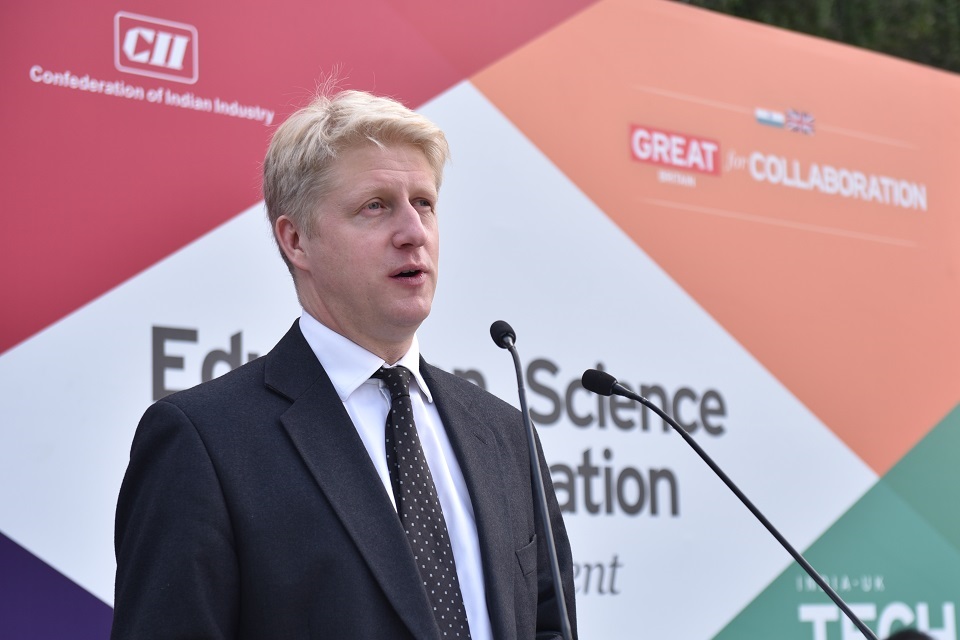UK-India science and innovation partnerships
Universities and Science Minister Jo Johnson outlines details of a series of UK-India science and innovation programmes.

Good afternoon and welcome. It’s great to be here today to celebrate the partnerships that continue to bring our 2 countries closer together.
The Chevening Programme is a shining example of this partnership, so it’s a particular pleasure to see so many of its scholars here. Indeed, I’m delighted to say that the programme in India is now the biggest in the world, with increased funding of £2.4 million last year, so that today we can offer up to 130 fully funded scholarships to the best and the brightest of India’s students.
In the Chevening Science and Innovation programme we are supported by Rolls Royce, one of the most famous engineering firms in the world. They take our scholars to Oxford University, recently confirmed as the world’s number one university.
And the newly launched Financial Services fellowship programme at the world famous King’s College is sponsored by the banking giant Standard Chartered.
I am extremely fortunate in my job in that I get to see the fantastic outcomes that are a result of the partnerships formed across the world as a result of the Newton Fund.
Those stemming from the Newton Bhabha Fund have been particularly impressive, and in recognition of this, I am pleased to announce that the first Newton Prize competition will be held here in India, with a prize of £1 million.
The competition focuses on public health and wellbeing, including issues such as anti-microbial resistance, disease, healthcare, and nutrition. Nomination will close in February 2017, and a panel of experts, chaired by the President of the Royal Society, Sir Venki Ramakrishnan, will announce the winners soon after.
As well as this, we have pledged to double the amount of UK funding in the Newton Bhabha Fund to £20 million by 2020. This means that we are able to launch even more high quality programmes and initiatives to tackle the great global challenges of the 21st Century.
And thanks to Newton-Bhabha funding, we are already making headway.
We all know that the future of our world is closely bound up with the future of energy. It’s a taxing issue, which is why we are setting up the Joint Virtual Centre in Clean Energy: a collaboration between Research Councils UK (RCUK) and India’s Department of Science and Technology (DST) which will work towards solving the problems of integrating smart grids and energy storage.
We will also be launching a call for joint research to reduce the levels of energy demand in the built environment – both to make energy more secure and affordable, and to reduce carbon emission.
We are also increasingly working in partnership with industry to escalate the rewards of our joint academic excellence. RCUK, Innovate UK and DST are announcing a new commercially focussed programme on innovative biotechnologies for cleaning, processing and exploitation of industrial waste between.
But we shouldn’t think of carbon emissions as an exclusively environmental issue.
Atmospheric pollution is a daily health issue, and it is important to fully comprehend air pollution hazards and their impacts. So I am pleased to announce that the first projects given funding under the programme are on Atmospheric Pollution and Human Health.
Sadly it’s not just the air that needs improving. Access to clean water resources is of crucial importance. In order to make this possible, RCUK and India’s DST are bringing together a programme of interdisciplinary research to improve water quality in support of India’s National Mission for Clean Ganga.
Nutrition and sustainable food security can further brighten the picture, so it’s encouraging to see that the Newton-Bhabha programme is funding the first projects to find new commercial solutions to post harvest food loss.
Against this background health can become a serious concern. But we are beginning pioneering work to fight illness and disease.
We are launching phase 2 of the UK - India joint Global Research Programme which will focus on reproductive health issues facing women and their unborn children.
And we’re turning our attention to anti-microbial resistance, or AMR. Fighting this will be crucial work, so I look forward to inaugurating the first meeting of the RCUK-India Strategic Group on AMR here in New Delhi tomorrow.
These are all truly great announcements showing the strength of collaboration and the depth of the relationship between our scientific communities.
But it’s not all about science – just as important are our cultures and heritage. The British Library is working to digitise its catalogue of Indian texts, and in time this will serve generations of Indian researches looking back through changes in language, lost languages and the very fabric of society itself.
This is why as part of my government’s commitment to our partnership we have agreed to give the library a further half a million pounds to increase the capacity of the digitisation programme.
I firmly believe that the relationships that we are creating through all of the excellent programmes that I have mentioned this afternoon can form the bedrock of our future partnerships.